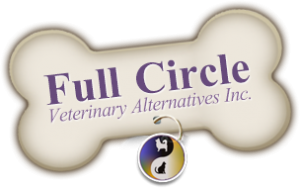Chinese Herbal Medicine
What is herbal medicine?
Herbal medicine is generally considered to be the use of plant materials to treat illness and promote health. Herbal medicines are important tools for healing in every culture. For instance, much of what we call Western Herbalism has its foundation in Europe, indigenous cultures in the America’s have rich understandings of their native healing plants, and many of us use herbs borrowed from the Ayurvedic medicines of India. Many of our pharmaceutical treatments have their origins in naturally occurring molecules.
At Full Circle Veterinary Alternatives, we focus primarily on Traditional Chinese Veterinary herbal medicine, although we may use some Western and Aryuvedic herbs from time to time.
What is Chinese Veterinary Herbal Medicine?
Traditional Chinese Veterinary herbal medicine is a body of medical knowledge on the use of the plant, animal and mineral components for treating the diseases of animals that are at least 2000 years old. Over the centuries, healers learned different ways to prepare and combine herbs to create unique and powerful medicines.
Chinese Herbal formulas usually contain multiple herbs and follow a general pattern where there is a primary herb, called the Emperor or King, that has the most significant action of the formula addressing the primary Chinese medicine patterns or causes of disease. This herb is supported by Minister herbs, who assist or enhance the desired actions of the Emperor herb. The next category is the Assistant herbs, which have three roles. First, they treat patterns of illness or complications that are often associated with the primary diagnosis. Secondly, they can suppress any toxic or extreme activities of the Emperor or Minister herbs and finally, they can counteract certain qualities of the formula to create a more balanced formula. For instance, if the main actions are all very cooling, some warm herbs may be added. The final category of herbs is called messenger or transporter herbs. They are the part of the formula that directs the actions to the appropriate diseased areas or organs within the body.
What conditions can Chinese Veterinary Herbal Medicine be used to treat?
Because Chinese Medicine is a complete medical system, there are herbal medicines to treat nearly any imbalance; however, there are situations where pharmaceuticals are more suited, or a combination of herbs and pharmaceuticals gives a superior outcome.
At Full Circle, we routinely use herbal medicines in many situations. Chronic kidney disease, which might be called Kidney QI, Yin and/or Yang deficiency in Chinese veterinary medicine, often responds well to several formulas.
Many cancers, like mast cell tumours, hemangiosarcomas, bladder tumours and anal carcinomas, can be slowed significantly by adding herbal formulas. Other patients who may be receiving chemotherapy, could benefit from herbal protocols to strengthen the impact of their chemotherapy and deal with the effects of the drugs.
Herbs for skin conditions can be extremely nutritive, anti-inflammatory and, in some cases, antibacterial. Gastrointestinal illness can benefit from herbal formulas to combat nausea and improve digestion. Many of our patients at Full Circle Veterinary Alternatives seek assistance for back pain, lameness or arthritic problems. Herbal medicine can augment the outcomes for these patients as well.
Are herbal medicines safe?
Despite having significant physiologic impacts, Chinese herbal medicines have far fewer side effects than pharmaceutical drugs. It is in part because the formulas are designed to include herbs that ameliorate side effects that might be common if an individual herb were used alone. There are, however, herbs that should not be used with pregnant animals and some herbs that, if mixed with certain minerals or vitamins as the interaction, lessen the impact of both.
The most common unintended effect of a prescribed herbal formula would be soft stools or vomiting. These signs should resolve quickly on stopping the herbal formula, and our Full Circle Veterinary Alternatives veterinarian will advise you on a formula or dose change.
Can my dog or cat safely take herbs with conventional drugs?
Most traditional herbal veterinary formulas can be safely used with conventional pharmaceutical treatments. There are a few individual herbs and formulas that have contraindications with specific procedures or drugs. Caution is advised when using herbs and pharmaceuticals with similar actions as additive effects could occur, leading to an overdose.
Our veterinarians consider a patient’s current drug therapy when selecting herbal formulas to ensure your pet’s safety.
How are herbal formulas given to my dog or cat?
Herbal formulas can be prepared in a number of ways. One technique is to take relatively unprocessed dried herbs and create decoctions (Tang) or teas by steeping or boiling the herbs in- water. Whole dried herbs can also be ground into a powder (san) and fed on food or encapsulated and given as a capsule by mouth.
Most formulations used at Full Circle Veterinary Alternatives are extract granules that represent several extractions of active ingredients in water, which are then evaporated to leave a powder that is highly concentrated. This powder can be formed into tablets, encapsulated or used loosely as an additive to food or treats.
Some herbal formulas are designed to be used topically and are in the form of pastes. Occasionally, we may also use alcohol-based tinctures topically or orally. When used orally, we recommend techniques to reduce the alcohol content before administering it to a pet.
If you have any questions, please give us a call at 902.461.0951
